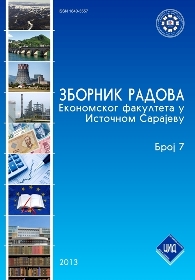PREDNOSTI I NEDOSTACI FIKSNOG KURSA (VALUTNOG ODBORA) U USLOVIMA EKONOMIJE BIH
ADVANTAGES AND DISADVANTAGES OF A FIXED EXCHANGE RATE (CURRENCY BOARD) IN TERMS OF THE ECONOMY OF BOSNIA AND HERZEGOVINA
Author(s): Ljubiša VladušićSubject(s): Economy
Published by: Ekonomski fakultet Pale - Univerzitet u Istočnom Sarajevu
Keywords: monetary policy; currency board; open economy; appreciation of the exchange rate; fiscal deficit
Summary/Abstract: Financial and economic crisis that hit the world economy in early 2008 caused the growth of public debt and large budget deficits in many countries, a high rise in unemployment, a reduction in foreign capital inflows to developing countries, a state intervention to rescue large financial institutions and to try to revive the capital markets, as well as a need for a larger assistance from IMF and other international financial institutions to the countries severely affected by the crisis. The BiH macroeconomic environment has significantly changed since then up to now, as a result of the above mentioned processes. The first signs of crisis in BiH began in the financial sector, specifically in September 2008 with the withdrawal of savings deposits, and soon the crisis spread to the real sector. The actual issue of interest for many experts, mostly local ones, was whether in these circumstances the Fixed Exchange Rate (Currency Board) that had been established in 1997 was an advantage or disadvantage for the BiH economy. The introduction of the Currency Board in BiH, as a superior institution in relation to the classical Central Bank in transition conditions, was aimed at avoiding interference and abuse by the state, certain interest and political groups and manipulation of the central bank, and the creation of conditions for the provision of price and currency stability, raising the budget balance, the establishment of convertibility and credibility of economic policy, supporting foreign trade, savings and investments, attracting foreign banks, financial integration with the developed countries, etc.. This paper gives an overview of the results of the analyzed phenomena related to the Fixed Exchange Rate in terms of BiH economy with specific recommendations: what to do to remove the disadvantages of the Fixed Exchange Rate in future.
Journal: Zbornik radova Ekonomskog fakulteta u Istočnom Sarajevu
- Issue Year: 2013
- Issue No: 7
- Page Range: 91-100
- Page Count: 10
- Language: Serbian

